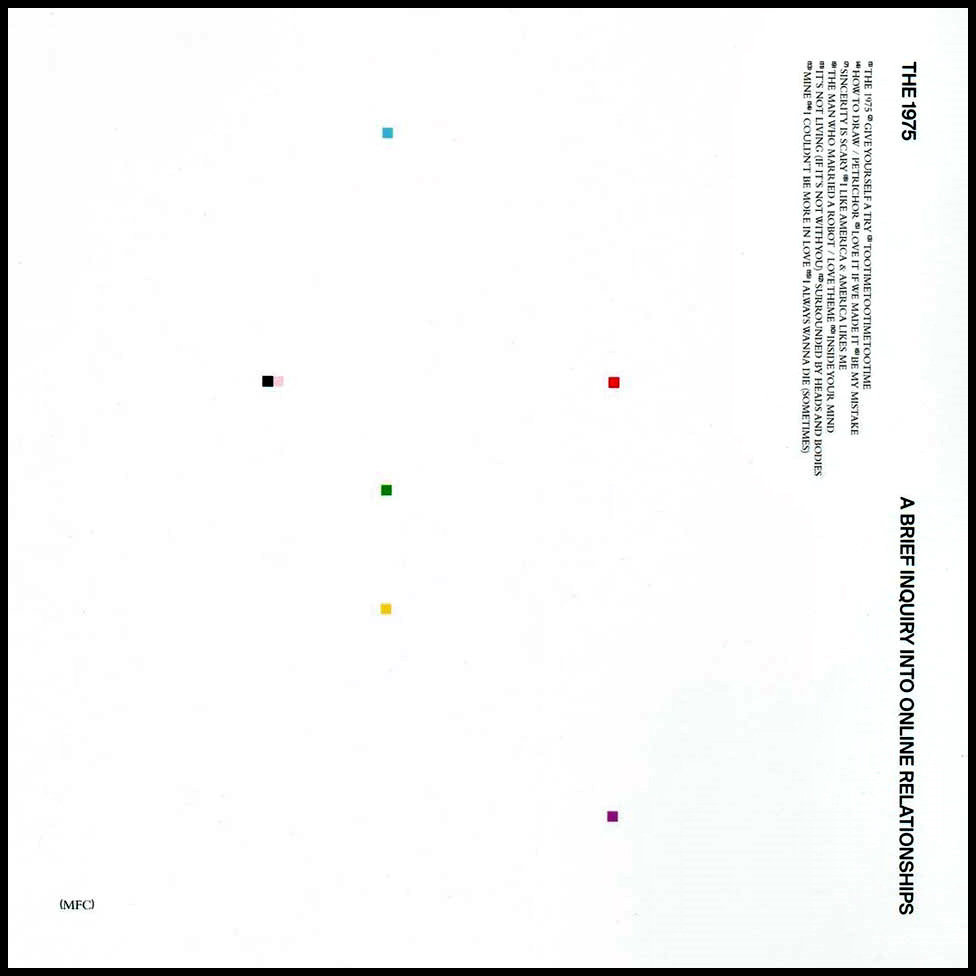Album review: The 1975’s new album explores personal struggles, offers comfort to listener

(Courtesy of Polydor Records)
“A Brief Inquiry Into Online Relationships”
The 1975
Polydor Records
Released Nov. 30

By Brooke Cuzick
Nov. 30, 2018 3:59 p.m.
The 1975 is finally living in the present.
With its computer-driven influences, the band’s third studio album, “A Brief Inquiry Into Online Relationships,” hit radio waves Friday. As its first release since 2016, the album features 15 diverse and head-turning songs that vary from auto-tuned dance anthems to stripped-back acoustic tracks that delve into lead singer and lyricist Matty Healy’s struggle with his own mortality. While the tone of the album twists as tracks progress, a sense of emotional confusion bonds them all together. Giving listeners a glimpse into his head, Healy’s lyrical genius ensures “A Brief Inquiry Into Online Relationships” secures a place as the most personal and revealing album in The 1975’s discography.
In the band’s classic style, the album opens with a self-titled track: “The 1975.” The song’s lyrics are its sole resemblance to the older tracks of the same name. This version’s minimalistic beat lends to vocal predominance, as opposed to the multilayered beats of the past. A distant-sounding piano starts the song off, but the gentle sound quickly reveals itself to be a facade. As robotic-sounding vocals emerge explosively, the tone is set for an album that strays far from the soft rock hits The 1975 has released before.
The second track, “Give Yourself a Try,” is led by a sharp guitar rhythm that emphasizes its chaotic nature. Healy takes listeners on a journey through his own life and reflects on his growth from past mistakes. The sole line in the chorus is instant in its encouragement, and begs the listener: “Give yourself a try.”
From there, the tracks quickly shift in sound. Though enjoyable, the beat-driven dance song, “TOOTIMETOOTIMETOOTIME” and the almost instrumental “How to Draw / Petrichor” are easily overshadowed by the album’s fifth track, “Love It If We Made It.” The song is one of the most powerful on the album because Healy is uncompromising in his commentary on political issues and the pain that follows them. Quick to critique America’s current government, he sings, “We’re just left to decay / Modernity has failed us / And I’d love it if we made it.”
But as the album continues, Healy is at battle with himself, figuring out how to express his desires in a world full of irony. “Sincerity is Scary” reflects Healy’s continuing struggle of living in a postmodern world. Jazz-style horns and drums make up the background, and a full choir completes the song’s chorus as Healy continues his search for personal vulnerability in a world taught to mask it.
“The Man Who Married a Robot / Love Theme” throws listeners a curveball halfway through the album. The track is thematically reminiscent of Radiohead’s album, “OK Computer,” as it uses an automated voice to tell the story of a man who sees the internet as his “best friend.” A simplistic piano track lulls quietly in the background, while a narrative forms to comment on the overwhelming presence of technology in the modern world of relationships, as the title of the album promises to explore.
“I like America & America Likes Me” and parts of “How to Draw / Petrichor” robotically distort Healy’s voice beyond recognition, to the point where he sounds like he, himself, has been taken over by technology. While this could come off as being too strong a vocal effect, the band uses the distortion well, extending the theme of technology that runs throughout the LP.
The album’s final tracks step away from electronic themes and return to a stripped-back sound for Healy to dive back into dealing with his emotional trauma. “It’s Not Living (If It’s Not With You),” driven by electric guitar, is a sonic nod back to the band’s first album, reflecting older rhythms as Healy opens up about his own struggles with substance addiction.
In “Mine,” a slow jazz ballad, Healy uses his voice differently than in prior songs. He softly croons about his love interest, unmistakably happy and tonally separate from heavier tracks on the album. Finally, “I Always Wanna Die (Sometimes)” closes the work on a positive note one would not expect from the title. Healy showcases his vocal maturity as he holds notes higher than those in songs typical of The 1975. The dark subject matter of Healy’s own suicidal thoughts are flipped on their head, instead turning the song into an uplifting display of power to refuse his dark temptations.
As the record shifts easily through contrasting sounds, “A Brief Inquiry Into Online Relationships” follows a deeper narrative than is typical of The 1975. Despite combining morose references to the political climate, substance abuse and technology’s impact on humanity, the album still somehow finds a way to leave listeners feeling hopeful and inspired by letting them know they are not alone in feeling trapped in society.


